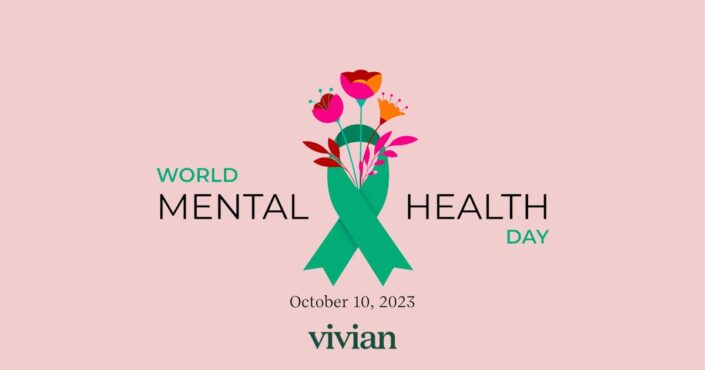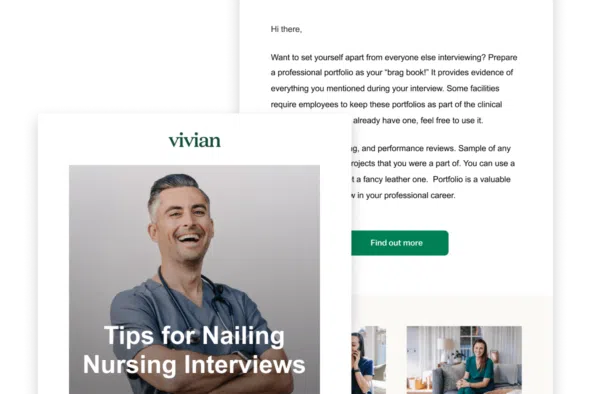Healthcare is a stressful and demanding profession, but that doesn’t mean your health should come second to your work. October 10, 2023, is World Mental Health Day, a perfect day to take a moment to check in on your overall health and well-being.
World Mental Health Day was founded in 1992 as an international day for raising awareness of mental health education and promoting advocacy against its social stigma. As a busy healthcare professional (HCP), it can be hard to find the time to practice self-care, but everyone benefits when HCPs take time to focus on their own needs. Being mentally healthy means you can stay energized and passionate about your work, which translates into better quality patient care when you’re at your best.
To help support you on your professional journey, we put together some tips and mental health resources for nurses and HCPs to use for World Mental Health Day and every day.
Why Your Mental Health Is Important

The challenges of nursing are well documented. Long hours, understaffing, a high-pressure environment and intense emotions wear on your mental health. In fact, registered nurses (RNs) experience depression at a rate that’s double that of other professions, according to a 2016 study in the Workplace Health and Safety Journal.
These pressures were only intensified with recent health crises such as the COVID-19 pandemic. In 2020, the National Institute for Occupational Health and Safety reported that 82% of health workers said they were emotionally and physically exhausted. In addition, nearly half of RNs reported they weren’t getting enough emotional support.
While more than half of the healthcare professionals who took part in Vivian’s 2023 Future of Healthcare Work Report ranked salary, benefits and staff-to-patient ratios as most important when seeking a new job, nearly 13% also cited mental health and well-being programs as being vital. Additionally, over 50% of respondents in the 2023 survey said they were asked daily or weekly to work overtime, and half of the staff clinicians surveyed took only one to two weeks of paid time off in 2022.
It’s essential to be aware of how the realities of a healthcare career can affect your mental health. As your stress levels rise, you might experience:
- Anger
- Irritability
- Impatience
- Sadness
- Lack of focus or distraction
- Difficulty making decisions
- Lack of appetite
- Insomnia
- Headaches
- Fatigue
Over time, chronic stress impacts the level of care you’re able to provide patients and potentially leads to compassion fatigue and burnout. It’s important that you are able to recognize these symptoms and take action to make changes to your routine.
11 Stress-Management Tips for Better Mental Health
In honor of World Mental Health Day, we’re putting the spotlight on the well-being of HCPs. However, RNs and Allied Health professionals must look after themselves year-round, not just one day a year. Read our tips below and explore ways to add mental health and wellness practices into your daily routine.
1. Get Back to the Basics
Self-care for busy HCPs means returning to the fundamentals of healthy living: eating nutritious meals, drinking plenty of water, getting fresh air, sleeping well and exercising. When you fulfill your basic needs, you build a solid foundation for your physical, mental and emotional health. You also replenish the energy you spend caring for others.
Focus on the essentials before you run on empty. For example:
- Plan meals and snacks for the week so they are ready to go
- Put away your device and get that extra hour of sleep
- Mix in going for a walk instead of sitting on the couch
- Spend time pursuing things you’re passionate about
A few simple choices can make an enormous difference to your well-being and help you reset before another workday rolls around.
2. Do Something for Yourself
It may seem impossible to set aside time for self-care when you’re balancing work, family and other commitments. However, even just 20 minutes out of your day can help you deal with anxiety as a nurse:
- Schedule some “me-time” into your daily routine: Whether it’s an early morning walk to watch the sunrise, a bubble bath or quiet time to journal before bed, slot the activity into your schedule. It’s too easy for your personal time to fall to the bottom of your to-do list.
- Take a mental health day: If you feel anxiety climbing, hit the pause button and take a break from the stress before you’re overwhelmed. Spending time with family, going on a hike or having lunch with friends can help put things into perspective.
- Take an extended break: One perk of travel nursing is you can arrange assignments to suit your schedule. Consider setting aside a couple of weeks between contracts to travel and explore, and give yourself time to rejuvenate.
3. Be Physically Active

When you feel wound up, grab your sneakers or yoga mat and get ready to sweat. Exercise delivers immediate health benefits, reducing anxiety, improving sleep quality and lowering blood pressure. According to the Centers for Disease Control and Prevention, even short amounts of moderate to vigorous physical activity can help release tension.
Of course, regular physical activity is essential in the long term. Stay active to improve cardiovascular health, strengthen bones and reduce the risk of depression.
4. Have a Plan for Handling Stress
Sometimes, a stressful situation hits you at work when you still have hours to go on your shift. You may not be able to leave, but you can take a few moments to ease some tension:
- Find a quiet spot to focus on breathing, even if it’s just for a minute
- If you can’t get away, settle for a few deep breaths, filling your lungs and exhaling slowly
- Go for a walk around the block while listening to your favorite song
- Run up a few flights of stairs to get your blood flowing
- Confide in a trusted coworker
5. Set Boundaries at Work and Home
Short-staffed healthcare facilities turn to their existing staff to cover the gaps, but each nurse can only do so much. It may be hard to say “no” to another overtime shift when patients need you, but you won’t be at your best if you overextend yourself. Accept the shift only if you feel capable, but advocate for your own wellness and establish work boundaries if you’re already at your limits.
You can also set boundaries in your personal life. For example, turn off alerts on your phone when you’re trying to relax or say “no” to joining another committee at your child’s school.
6. Try Meditation

More Americans are discovering the benefits of meditation, a practice that focuses on slowing your breathing and calming the mind. A 2017 National Health Interview Survey found that 14.2% of American adults practiced meditation, up from just 4% in 2012.
Meditation can positively affect your brain and mental health by strengthening connections between neurons. According to the Cleveland Clinic, meditation affects the parts of the brain that control your senses, emotions and ability to concentrate and focus.
With meditation moving into the mainstream, it’s easier than ever to try it at home. Read our tips on incorporating meditation into your routine and suggestions for apps to download onto your phone to help you get started.
7. Achieve Calm with Mindfulness
When you get caught up in stress, it’s easy to be overwhelmed. Practicing mindfulness helps ground you in the moment so you’re focused on the present instead of worrying about the past or future.
For example, concentrate on your breath and how you’re feeling. You might realize you need to unclench your jaw or relax your shoulders. Acknowledge your surroundings, such as a tree outside a window or the breeze on your face. These simple practices can help nurture positive thinking and gratitude, which in turn, relieves some of the external stress you’re feeling.
8. Acknowledge Your Emotions

Intense emotions, such as sadness, grief, frustration and anger, don’t disappear if you ignore them. Acknowledging your feelings and finding a healthy way to channel them is vital. Avoiding emotions only puts more strain on your physical and mental health.
Some ways you can release your feelings include:
- Talking to a friend, family or colleague
- Writing in a journal, drawing or pursuing another creative outlet
- Speaking to a counselor or other health professional about effective coping mechanisms
9. Live with Intention
Frequently, stress is caused by feeling out of control and having to react to situations constantly. Counteract this by deciding what’s important to you and living purposefully to achieve it.
Perhaps you’re nearing the end of a long shift. If you intend to rush through so you can go home on time, you’ll likely create more stress. But if you intend to make sure your patient is comfortable before you go, you have a different purpose and mindset.
Maybe a colleague is a source of anxiety. You can acknowledge that you can’t change how they behave and make it an intention to focus your energy on what’s important: being calm and present for your patients.
You can also be purposeful with your time. Once you finish your shift, move your focus to your next goal, whether it’s yoga class or dinner with the family. When you act deliberately and with intention, there’s calmness and a reason for everything you do.
For more tips on how to handle work overload, read our How to Avoid Common Time Management Pitfalls in Nursing article.
10. Tap Into Mental Health Resources for Nurses & HCPs

Sometimes, you’ll simply need more support. Take advantage of available resources to get you through difficult times:
- Employer-sponsored employee assistance programs can offer counseling services and treatment referrals
- Many healthcare facilities provide internal programs to support mental health
- The Well-Being Initiative provides a page of mental health resources specifically for nurses
- The Centers for Disease Control and Prevention has resources for public health workers and HCPs
- Peer support programs let you talk to other HCPs who understand the challenges of your job
- The National Alliance on Mental Illness provides mental health information and resource referrals and is available by phone, text, email or chat
11. Broaden Your Options
Nursing is a valuable and in-demand skill, leading to many employment opportunities for RNs. If you’re feeling stuck in your job or burned out from it, explore other exciting options available to you. You can explore new certifications to change your nursing specialty and take on new challenges or work fewer shifts as a per diem nurse. Travel nurses are also in demand to fill temporary positions across the country, enabling you to put your skills to work in different settings while exploring exciting new locations.
The Allied Health field is another area in high demand, with thousands of staff and travel allied health roles open for HCPs across the country.
Whichever route you choose, Vivian wants to support you in your career journey. Take advantage of our resources and let us help simplify the process by creating a Vivian Universal Profile so recruiters know you are fully prepared and ready to get to work.









